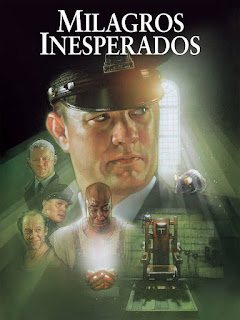Official film poster of “The Green Mile” used under fair use for editorial review.
The Green Mile (1999): A Poignant Tale of Miracles on Death Row
Introduction
Directed by Frank Darabont and based on Stephen King’s novel, The Green Mile (1999) is a deeply moving drama set in a 1930s Louisiana prison. Tom Hanks stars as Paul Edgecombe, a death‐row corrections officer overseeing the “Green Mile,” where inmates await execution. Their routine is upended by the arrival of John Coffey (Michael Clarke Duncan), a towering man with a gentle spirit—and an extraordinary gift for healing. Blending elements of the supernatural with profound human drama, The Green Mile examines justice, compassion, and the possibility of miracles in the darkest places.
1. Plot Overview
Paul Edgecombe (Tom Hanks) narrates his time as a senior guard at Cold Mountain Penitentiary’s death row block—nicknamed “The Green Mile” for its faded linoleum floor. When John Coffey (Michael Clarke Duncan), convicted of a heinous crime, arrives, the officers expect another dangerous inmate. Instead, they’re confronted with Coffey’s childlike innocence and extraordinary healing powers. After witnessing Coffey miraculously cure Paul of a urinary infection and resurrect a mouse named Mr. Jingles, the guards begin to question his guilt—and the moral weight of executing a man capable of such goodness. Meanwhile, cruel inmate “Wild Bill” Wharton (Sam Rockwell) sows chaos. As the guards grapple with their duty and conscience, Paul must decide whether to obey the law or heed the miraculous truth before time—and Coffey’s tragic fate—runs out.
2. Direction & Visual Style
Frank Darabont brings a reverent, deliberate pace to The Green Mile, allowing emotional moments to resonate. The film’s muted sepia tones and period-accurate set design evoke the Depression-era South. Darabont uses close-ups—Paul’s haunted eyes, Coffey’s gentle smile—to convey unspoken empathy. Long tracking shots down the Mile immerse viewers in the characters’ routines, while strategic silence amplifies tension before Coffey’s miracles. Thomas Newman’s piano-driven score weaves melancholy and wonder, underscoring both the oppressive weight of death row and the supernatural grace that Coffey brings. Darabont balances raw violence (the whipping scenes) with moments of quiet humanity, achieving a tonal harmony that elevates the story beyond a simple prison drama.
3. Performances & Characters
Tom Hanks anchors the film with his trademark empathy as Paul Edgecombe—a man of principle worn down by duty. His nuanced performance captures the conflict between enforcing the law and honoring Coffey’s gift. Michael Clarke Duncan delivers a career-defining turn as John Coffey: his gentle drawl, tear-filled eyes, and imposing presence create a character both awe-inspiring and heartbreakingly vulnerable. Sam Rockwell is chilling as “Wild Bill” Wharton, whose unhinged cruelty contrasts starkly with Coffey’s kindness. Supporting roles—including David Morse’s grieving Brutus “Brutal” Howell, Barry Pepper’s anguished Dean Stanton, and Michael Jeter’s sweet-natured Eduard Delacroix—enrich the Mile’s sense of family. Each actor brings authenticity to the ensemble, making every joy and sorrow deeply felt.
4. Key Themes & Moments
The Green Mile explores themes of justice, redemption, and the human capacity for both brutality and mercy. Coffey’s miracles—healing a sick mouse, curing Paul’s ailment, and undoing a child’s tumor—pose an unanswerable question: how can a man so divine be condemned? The film confronts capital punishment’s moral ambiguity, particularly in scenes where guards wrestle with their roles in executions. Memorable moments include Coffey’s whispered confession of his desire to die, the tender baptism of Mr. Jingles, and the Mile’s final, tearful walk. Darabont doesn’t offer tidy answers; instead, he invites viewers to ponder faith, empathy, and the possibility that true miracles may coexist with profound injustice.
Conclusion & Rating
Pros:
-
Powerful, career-best performance by Michael Clarke Duncan
-
Frank Darabont’s sensitive, atmospheric direction
-
A moving, thought-provoking meditation on compassion
Cons:
-
Nearly three-hour runtime may test some viewers’ patience
-
Graphic depictions of violence can be unsettling
Rating: ★★★★★
Which Green Mile miracle moved you most—or left you questioning? Share your reflections in the comments below or tweet us @ReelMeetsComic!



